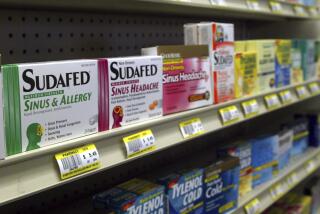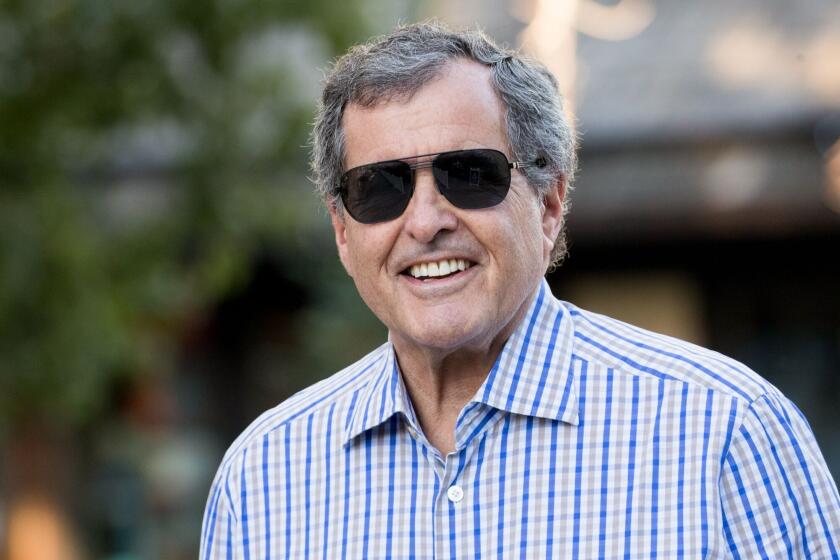CigArrest Ban No Great Loss to Advantage Life : Regulation: It sold the rights to the stop-smoking program in February, so FDA action won’t hurt much. Stock price is stable.
- Share via
LAGUNA HILLS — Advantage Life Products Inc. says it will have few withdrawal symptoms in the wake of a federal order for it to stop distributing a popular anti-smoking product.
In fact, the company said Thursday, it has all but kicked the habit already. Advantage Life, which for five years had manufacturing and distribution rights to the CigArrest anti-smoking program, sold those rights in February to a Pennsylvania infomercial company.
Advantage Life, based in Laguna Hills, continues to market CigArrest, which is sold over the counter in drugstores, but only under a “management license” under which the company is paid independently of how many CigArrest programs are sold.
“We are no longer receiving any revenues tied to CigArrest sales,” said Jim Stapleton, Advantage Life’s chief operating officer.
The company is one of a handful across the nation that sell anti-smoking products containing lobeline sulfate. On Wednesday, the U.S. Food and Drug Administration issued a ban, effective Dec. 1, on the sale of such products.
Apparently, Advantage Life’s financial stability is assured, at least for the short term. Its stock, traded on the NASDAQ market, closed unchanged Thursday at 90.6 cents a share after falling sharply earlier in the day.
That was good news for the company, which has been struggling and posted a loss of $2.2 million on $1.2 million in revenue for fiscal 1992. Figures for its latest fiscal year, which ended April 30, are not yet available. The company’s most recent nine-month figures showed a $598,710 loss on revenue of $1.8 million.
The FDA ban was imposed because the federal agency has not received any convincing scientific proof that lobeline sulfate is effective in helping ease smokers’ withdrawal symptoms, FDA spokesman Michael Schaffer said.
He added, however, that if any company can provide such proof, the FDA will consider approving the compound for market. Schaffer emphasized that the federal agency’s order does not mean that the drug is unsafe or that the FDA has found it to be ineffective.
“Nothing has shown them to be effective,” Schaffer said of lobeline sulfate products. “But the FDA welcomes efforts to take part in any study with any firm to assist in (new drug) approvals.”
Why the brouhaha now, after companies such as Advantage Life have been selling products with lobeline sulfate for years? Some company officials speculate aloud that they are the victims of lobbying by large pharmaceutical makers who want to knock over-the-counter products out of the stop-smoking arena. Anti-smoking drugs sold by prescription are not affected by the government ban because they have gone through the formal FDA approval process.
Schaffer proffered a different reason: “The time had come to look into (the issue).”
For decades the FDA has been studying a long list of quasi-drugs--some of which have been around since the 19th Century--that were grandfathered in by the agency. Such substances have been in use for treatment of everything from overgrown corns to backaches.
Lobeline sulfate, derived from an herb, has been used as a respiratory treatment since the early 20th Century. It was introduced in the 1950s as an anti-smoking drug because it raises blood pressure, much as nicotine does, said John Bancroft, chief executive officer of More Direct Response Inc., the Carlsbad company that introduced CigArrest.
Rather than targeting anti-smoking drugs on grounds of misrepresentation by the companies or in the wake of public complaints, Schaffer said, the FDA is simply addressing the issue of whether lobeline sulfate and other drugs that have not been clinically tested should be allowed to stay on the market. The answer in this case, Schaffer said, is a resounding no.
Bancroft, however, was critical of the FDA’s action. He predicted that his company, which continues to receive royalties on sales of CigArrest, will suffer financially. The ban, he said, will also hurt Advantage Life--despite that firm’s claims to the contrary--and the East Coast company that now owns the rights to the product.
How harsh the financial troubles might be has yet to be seen, Bancroft said. He estimates that, since 1985, about 5 million CigArrest programs have been sold at $19.95 apiece.
The CigArrest package contains seven days’ worth of vitamin and lobeline sulfate tablets. It also includes a behavior-modification program consisting of a videocassette and an instruction manual.
Bancroft acknowledged that he knows of no hard evidence that proves lobeline sulfate’s effectiveness. In fact, he said, when his company designed CigArrest, researchers understood that the behavior-modification part of the package was just as important as the drug, if not more so.
Nevertheless, Bancroft said, his company is now looking into alternate compounds to replace lobeline sulfate as well as launching clinical studies to investigate its effectiveness.
In the meantime, Regal Communications Inc., the Pennsylvania company that now has rights to CigArrest, will direct manufacturers of the tablets to leave out the lobeline sulfate--effectively turning the tablet into a placebo, company officials said. The FDA said it cannot ban such an altered tablet from reaching the market.
CigArrest packages already on the shelves of drugstores will still contain lobeline sulfate until the company’s inventory runs out or the ban becomes effective, according to the FDA’s order.
“We wanted to be fair,” Schaffer said of the December deadline, “so they can work everything out.”
Until then, Advantage Life’s Stapleton said, his company will sell Regal’s CigArrest, along with that company’s other products, which include an automatic sweater-knitting machine, a biodegradable citrus-based cleaning product and a lipstick-type product called Last Kiss.
Advantage Life will continue to be bullish about Regal’s products, Stapleton said. To maintain sales of CigArrest, his company will soon launch a nationwide advertising campaign focusing on the benefits of the product’s behavior-modification plan, he said. “We’ll let everyone know it is a complete stop-smoking program, of which lobeline sulfate is a small part.”
He said the company is doing well with its other products: PMS Solutions, Cholest-Control, InsomAway and Be Safe, a package that teaches people about the dangers of AIDS.
“As you can see,” he said of the FDA ban, “the actual effect to our company is minimal.”
Products Affected
New shipments of over-the-counter smoking cessation products containing lobeline sulfate and silver acetate will cease on Dec. 1 until they can be reformulated. A partial list of products affected:
* CigArrest
* Bantron
* Tabmint
* Smoke-X
* Nikoban
* BanSmoke
Sources: U.S. Food and Drug Administration, Regal/Advantage; Researched by JANICE L. JONES / Los Angeles Times
More to Read
Inside the business of entertainment
The Wide Shot brings you news, analysis and insights on everything from streaming wars to production — and what it all means for the future.
You may occasionally receive promotional content from the Los Angeles Times.










